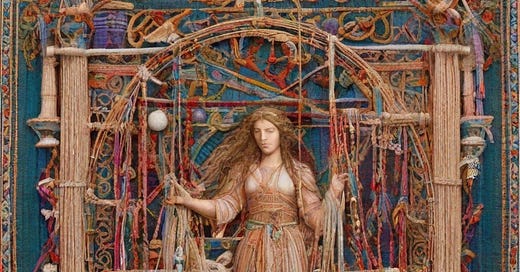There's a saying among therapists that people want to feel better but not get better. In other words, it's normal to want to alleviate our pain and anxiety without having to actually change our ways, which is the most challenging yet most important part of psychotherapy and psychological growth!
We've all been there. In dating, for instance, you might swear you’ll never date another unavailable partner and yet find yourself once again chasing a “distancer.” You take a step toward being the way you want to be in the world, and before you can celebrate your victory, you undo your progress with an old and unhealthy pattern. It can be maddening!
The late psychoanalyst Stephen Michell had a powerful metaphor to explain why we fall into doing and undoing our psychological progress. In teaching about this tendency and how it plays out in therapy, Mitchell drew on the Greek myth of Penelope's Loom. First, here's a recap of Penelope's story.
For two decades, Penelope has clung to the hope of her husband Odysseus’s return from the Trojan War.
"He's got to come home," we can imagine Penelope praying.
Multiple suitors vie for her hand in marriage, trying to persuade Penelope that Odysseus will never come back, but she adamantly rejects this unbearable reality.
Instead, she keeps these suitors at bay with a clever story involving her loom. "I promise to choose a husband," Penelope says, "but not until I complete weaving a burial shroud for Odysseus's father. Once it's finished, I'll entertain the idea of remarriage. I promise!"
Little do the hopeful suitors know, that every night, Penelope secretly unravels the shroud. This nighttime unraveling becomes her silent rebellion against accepting her husband's death and choosing another man. By day, she weaves, and by night, she stealthily undoes her day's progress. This becomes her compromise, a delicate dance to remain faithful to Odysseus and ward off the impending fate of remarriage. Her plan works for three years until her secret is discovered.
What Can Penelope Teach Us?
Mitchell described Penelope's story as a metaphor for our patterns of relating to ourselves, others, and the world that resemble a tapestry on Penelope's loom.
Our inner worlds are rich with relationships and figures from our early lives that impact how we see ourselves and others. This tapestry of people, memories, and experiences we carry within us shapes our desires and pursuits. At the same time, this tapestry can keep us stuck in unhealthy ways of relating to ourselves and others that are self-limiting. And much of this influence is outside our awareness.
According to Mitchell, all of us are shaped by our early environments. As he explains, our parents were the "only show in town." But when it comes to finding our authentic selves, it's the rigidity of what our early environment required of us that matters. How broad or limited was our range of self-experience as children? How tightly do we hold on to old ways of being to avoid anxiety? It's this continuum of fluidity vs. rigidity that matters when it comes to being the best version of ourselves - weaving our loom.
While we may work hard to find new ways of relating, those old and less adaptive patterns are so easy, even luring, to fall back into. So, like Penelope, we consciously weave healthier ways of relating to ourselves and others and then unconsciously unravel our progress by falling back into old, less healthy ways of relating.
For me, weaving and unraveling are about being less conflict-avoidant. For instance, I would rather not give negative feedback—even when I know it’s necessary—because I fear hurting someone’s feelings. That’s my old pattern. The new tapestry I could weave would look like pushing myself through the anxiety and say the things that need to be said. Although I try to push myself to be more direct, it’s so easy for me to retreat and avoid. Falling back on avoiding is the unraveling of my shroud.
We move in opposite directions. Our conscious efforts align with Penelope's daytime labor, seeking direction and purpose. Yet, like her nighttime sabotage, we unconsciously create restraints and obstacles, reflecting a deep loyalty to the familiar in our patterns of relating to ourselves and others - even when the familiar is undesirable.
Am I Weaving or Unraveling? How to Tell
We all have relational patterns with ourselves and with others. Some enrich our lives, while others hinder us from living to the fullest. Often, we feel drawn to something, a person, a job, or a new role in life that promises meaning and joy. And just as we allow ourselves this awareness, the "what ifs" come in. What if I fail? What if they let me down? What if, what if, what if?
It's how we respond to these knee-jerk "what ifs" that determines the weaving or unraveling. If we take our own "what if" and the anxiety that provokes the question at face value, we may want to retreat and play it safe - not apply for the job, not ask the person out, not volunteer for the new role.
But when we duck out, we unravel the shroud and deny the world and ourselves our wholehearted participation. On the other hand, if we say "yes" and push through the inevitable anxiety, we weave our loom and become more of ourselves.
Questions for Reflection
When was the last time you pushed yourself to do something that felt outside your comfort zone—and it paid off?
Is there a way you unravel your personal growth by falling back on old patterns?
I want to be sure I’m writing about topics that are most helpful to you, so please let me know what you think by answering this quick poll or leaving me a note in the comments! Thank you so much.




